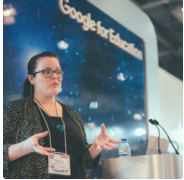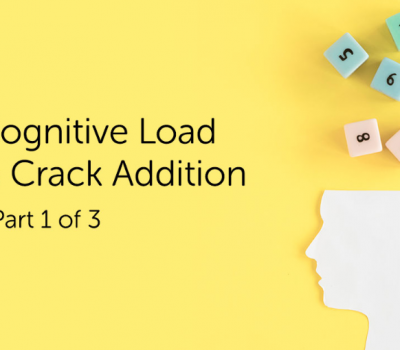


Our team sorts through all blog submissions to place them in the categories they fit the most - meaning it's never been simpler to gain advice and new knowledge for topics most important for you. This is why we have created this straight-forward guide to help you navigate our system.


And there you have it! Now your collection of blogs are catered to your chosen topics and are ready for you to explore. Plus, if you frequently return to the same categories you can bookmark your current URL and we will save your choices on return. Happy Reading!
You don’t know what you don’t know. Is a saying we’ve probably heard and maybe even said. But it is true. I knew nothing outside secondary GCSE maths when I trained to teach, and had I known more I would have been a better teacher, for sure.

My knowledge of the skills required to have strong ordinality (putting numbers in order) and cardinality (knowing 5 is the same as five dots) was weak when I started teaching. When I became a parent, it became important to me to know more about these concepts and the best ways to teach them at home. As my child began school, I learned more from their teacher too. I never thought that teaching ordinality or cardinality wasn’t important, I just didn’t know enough about it. I think we can learn so much from other age phases different from the ones we teach. When I began supporting functional skills teachers in FE, all the things that I had learned as a parent became useful to share with colleagues.
This isn’t a criticism of my PGCE. I felt that my tuition fees gave value for the secondary maths teaching I was prepared for. But in my classroom, I encountered Siobhan (not her real name). Siobhan was bottom set year 10 and I was told that all my efforts were to be to help 100% of years 10 and 11 achieve grade G. If you imagine a ‘whack a mole’ game of getting students to sit exams for the full period and attempt questions, you have a close idea of what my role was. I loved it, I loved the personality of bottom set. I loved unlocking the maths that connected with them. We once did 6 weeks on two way tables because 10Y5 loved them so much!
Yet Siobhan struggled. Nothing that I tried could engage her. We did ratio through baking. We did coordinate geometry on the playground with chalks. We did a fundraiser car wash for decimal and money addition, plus a never ending supply of quizzes and ‘fun’ maths tasks in the classroom.
Siobhan was cared for by a family member. They openly told me that they were ‘rubbish’ at maths, that they were frustrated that they had no maths qualifications and that they expected Siobhan to be the same and not achieve her target E. Had I known more about FE and the local offer of colleges to support adults to re-engage with short courses on numeracy all the way through to resitting GCSEs I would have been able to direct this carer there. Perhaps we could have even hosted a local college on site to support our carers who struggled with maths? Truth is, I didn’t know much outside what I was trained for, secondary maths.
One day there was an incident and I sent for on call. The head arrived and removed Siobhan. There were other incidents with other staff and the head handed Siobhan a lengthy exclusion which was followed by a series of unsuccessful managed moves.
Fast forward five years and I was working in a coaching role in FE and I went to visit our SEND provision for 19+. I went to observe a new teacher in a class helping young people learn how to live independently. I want to just recognise that these provisions exist and how wonderful it is that they do. In the observees class was Siobhan, she was engaged and learning. I was floored. I caught up with the manager after the observation to ask about Siobhan. Siobhan now had an EHCP in place until the age of 25. Siobhan was living in care but she was to live on her own soon and they believed she would be ready.
I left the SEND provision with a million thoughts. How significant was my part in all of this? Siobhan didn’t have an EHCP when I taught her. Yet why didn’t I do more? Truthfully, my mainstream experience meant that I didn’t know how to best support a range of needs. If I’m honest the school didn’t either. My PGCE covered differentiation for students in mainstream with additional needs but, on reflection, I think Siobhan probably needed specialist support before I became her year 10 maths teacher.
Truth is, we don’t know what we don’t know. If we don’t know how wonderful the work our primary and FE colleagues are doing, we won’t learn and grow as teachers. If we don’t know what our wonderful FE provisions are offering, we won’t be able to signpost carers or students to the range of support available either. I don’t think I have ever seen a teacher teach and not learned something. I wish I had seen more teachers from outside my secondary setting sooner.

The author

Read more

Read more

Read more

Read more

Read more

Read more

Read more

Read more


Are you looking for solutions? Let us help fund them! Nexus Education is a community of over 11,000 schools that come together to share best practise, ideas and CPD via online channels and free to attend events. Nexus also offers funding to all school groups in the UK via nexus-education.com


Established in 2011, One Education is a company at the heart of the education world, supporting over 600 schools and academies. Our unique appeal as a provider is in the breadth and synergy of the services we offer, supporting school leaders, teachers and support staff to achieve the best possible outcomes for their pupils and staff.

School Space is a social enterprise that has empowered schools for over 12 years through their profitable and hassle-free lettings services. So far, they’ve generated over £5 million in revenue for education, helping to connect over 200 schools with their local communities.


Operoo is a school operations and productivity platform. We help thousands of schools and trusts to eliminate slow, expensive and repetitive tasks. Operoo helps schools streamline and digitise processes, drastically reducing the associated costs: From student pre-admissions, permission forms, payments, and school trips; to medical information and emergency contacts, incident reporting, staff agreements, and more in over 100 languages.


Unify is an online sales and marketing tool that allows users to create tailored personalised documents in moments.


There’s nothing special about the energy we sell. In fact, it’s exactly the same energy as all our competitors provide. But there is something special about the way we do it. Where others complicate the process, we simplify it. Where others confuse customers with hidden terms, we’re an open book. And where others do all they can to make as much money from their customers as possible, we do all we can to make as little. Everything we do, we do it differently. Our customers are a privilege. One we’ll never take advantage of.


Securus provide market-leading monitoring solutions to safeguard students on ALL devices both online and offline. We also offer a full monitoring service, where we carry out the monitoring on behalf of the school, freeing up valuable staff resources. From the smallest school to large MAT groups, Securus offers safeguarding protection for all!


As European leaders of Time Management Solutions, Bodet offer Lockdown, Clock, Bell & PA Systems. Harmonys, our five-in-one IP/PoE Bell System, provides a unique customisable lockdown or panic alarm alert. Melodys, a Wireless Bell System, is useful where wiring can be difficult.